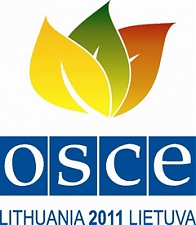Baltic States – CIS, Energy, EU – Baltic States, Legislation, Lithuania, Security
International Internet Magazine. Baltic States news & analytics
Tuesday, 03.02.2026, 14:44
Lithuania takes over OSCE chairmanship
 Print version
Print version |
|---|
"The OSCE can do more to address old and new threats and challenges in the 21st century – both internal and those stemming from outside the OSCE area." He mentioned cyber-security, trafficking of people and drugs as examples of transnational threats affecting all of the OSCE. Minister Azubalis stressed the Lithuanian Chairmanship's intention to actively uphold human dimension principles: "In the OSCE, human rights and fundamental freedoms are at the core of security." He cited the crucial importance of media freedom and the security of journalists for the proper functioning of a democratic society, writes LETA/ELTA.
"Lithuania, as a part of the Baltic Sea region and a member of the European Union and NATO, believes that a network of regional and sub-regional organizations, complementing each other's activities and those of the OSCE, will be more than the sum of its parts. Synergies between such organizations are vital for building a stronger security community," Minister Azubalis said.
"Regional co-operation is also vital for building long-term stability in volatile regions and may be an important contribution to addressing protracted conflicts in the OSCE area," Minister Azubalis said, stressing that the advancement of the solution to protracted conflicts in Transdniestria and South Caucasus, as well as the situation in Georgia, will be a priority of the Lithuanian Chairmanship's agenda. "The OSCE has an important role to play, in particular through the promotion of understanding and tolerance between the societies which are parties to the conflicts, and we would like to see a more active OSCE role here."
Minister Azubalis also mentioned the need to jointly develop common principles in the field of energy and said that the OSCE can promote dialogue and co-operation at the regional and cross-dimensional level in this sphere. Minister Azubalis took over the Chairmanship from Kazakhstan's Foreign Minister and State Secretary Kanat Saudabayev, whose country chaired the OSCE in 2010.
"I would like to express my gratitude to Foreign Minister Kanat Saudabayev for his dedicated work as the OSCE Chairperson-in Office towards strengthening the security in Europe as the OSCE Chairperson-in Office, and especially for holding the OSCE Summit in Astana, the first top-level meeting of the Organization in 11 years," Minister Azubalis said. "I would also like to welcome Ireland and Foreign Minister Micheal Martin to the OSCE Chairmanship Troika." In the Astana Commemorative Declaration, participating States have tasked the Lithuanian and subsequent chairmanships of the OSCE with "organizing a follow-up process within the existing formats, taking into consideration ideas and proposals put forward by the participating States, including in the framework of the Corfu Process". On 13 January in Vienna the new Chairperson-in-Office will outline the Lithuanian Chairmanship's priorities to the Permanent Council, a key OSCE decision-making body.
Lithuanian Foreign Minister Audronius Azubalis, as the OSCE Chairperson-in-Office, on December 31 expressed his deep regret over the non-extension of the mandate of the OSCE office in Minsk by the Belorussian authorities. This is more so disappointing in light of the commitments the Heads of State and Government have undertaken at the OSCE Summit in Astana, the Foreign Ministry reports. "Since 1998 the OSCE Office in Minsk has been providing valuable support to the government's efforts to promote institution building, consolidate the rule of law and develop relations with civil society in accordance with OSCE principles and commitments, as well as develop activities in the economic and environmental dimension. Its mandate has not been completed. There is an important job for the OSCE to continue in Belarus", Minister Azubalis said. In this light, he calls upon the Government of Belarus to review its position so, that OSCE presence in Minsk could continue.
Minister Azubalis also stressed the importance of the work carried out by all OSCE field operations, in accordance with their respective mandates, in assisting participating states with implementing their OSCE commitments.
The mandate of the OSCE Office in Minsk was renewed annually by the 56 OSCE participating States and it expires on December 31.








 «The Baltic Course» Is Sold and Stays in Business!
«The Baltic Course» Is Sold and Stays in Business!

